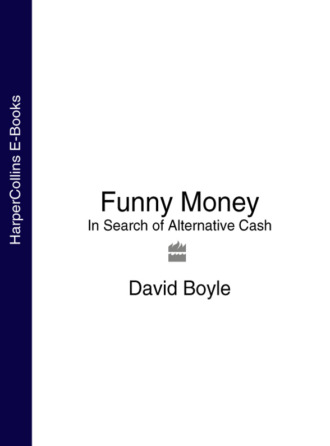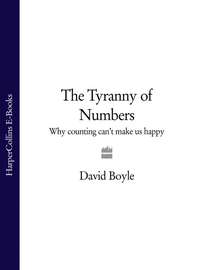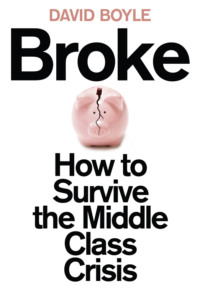
Полная версия
Funny Money: In Search of Alternative Cash
LETS is a whole new kind of money altogether. What do you do, asked the people who came up with the idea, when you are in a community which is rapidly running out of cash? You have the people with skills and the time on their hands, and you have the jobs that urgently need doing – but no money to bring the two together.
The traditional definitions of money – a medium of exchange, a store of value and a unit of account – all apply equally well to LETS. Accepting money instead of a direct swap is a kind of agreement to accept something which is not useful in itself, but which you know can be exchanged later for something which is. It’s the same with LETS, but with LETS you simply imagine a new kind of money and start trading in it. You go into debt to your neighbour, and denominate that debt not in pounds or dollars, but a whole new currency of your choice which you agree about. The first LETS currencies were called ‘green dollars’, but you can probably do better than that. And hey presto! The money exists, the job gets done, and somebody has to pay off the debt by doing something else in exchange for the same currency. No pounds or dollars are involved, no bank accounts reached into, but it is money nonetheless. LETS currencies are a magnificent burst of independence from governments, bank managers and bureaucrats: they allow people to create the money themselves. The idea emerged in British Columbia in the late 1970s, the brainchild of an academic called David Weston, and was given its present form in the early 1980s by Scots-Canadian Michael Linton, whose inspiration has taken LETS all over the world.
The biggest systems, like the Blue Mountain LETS in Australia, involve over 2,000 people. I ran across the idea in New Zealand, at the Auckland Green Dollar Exchange – a regular meeting of enthusiastic traders, surrounded by assorted knitted hats, jams, cakes, beer, eggs, leaflets and some bilious green armchairs. I watched astonished as one woman sold her genealogical skills for green dollars to a woman trading mittens. This was 1991, and already 0.1 per cent of New Zealand’s population were dealing in green dollars. If you signed on the dole, the social security officials would give you a leaflet about it. It all seemed a long way from the UK.
Michael Linton brought LETS to Britain at the TOES meeting in 1985, and in 1992 – encouraged by the recession – it suddenly took off. By Christmas there were forty trading systems up and running, and the currencies had strange names which caught the imagination of journalists. The new currency for Stroud was called ‘strouds’, in Manchester ‘bobbins’, in Bath ‘olivers’; ‘groats’ in Stirling, ‘tales’ in Canterbury. And in Brixton they were called ‘bricks’; in Donegal, they fell back on ‘sods’, which must have been confusing. It was almost like a secret code – Salisbury has its own special money for kids, called ‘kebbles’. Their parents trade in ‘ebbles’. The turnover in local money was by then the equivalent of £100,000 a year.
The expansion has continued since. There are now over 450 local currency systems in the country. Some involve just a few neighbours. Some, like the local money in Kingston upon Thames, allow you to buy organic vegetables. Some, like the system in Manchester, allow you to pay part of your rent. The European Commission gave a grant to Bradford City Council to set up its own currency, and researchers think the equivalent of £2 million is traded in LETS currencies in the UK every year. The idea links people across class, age and income, and it allows them to think more widely about the kinds of things they can do – be it making cakes, T-shirts, sewing, baby-sitting, accountancy, law, building or drawing astrological charts. People report feeling liberated using these whimsical new currencies, and it builds communities. And not a penny comes from the banks.
‘It attracts more open-minded people,’ one member of a Northern Ireland LETS money system told Jonathan Croall for his report LETS Act Locally. ‘And that helps to bridge the gap between the two communities. That’s important to me, after my narrow upbringing. I have dreamt that LETS will eventually grow big enough in Northern Ireland to make a real difference.’ LETS is now an increasingly familiar idea in Britain, though it is too early to tell whether it is going to stay in a marginal niche or break out into the mainstream. The real innovations are happening in the USA.
IV
So I went there to find today’s new alchemists, to the land of the Treasury bill and Wall Street and the dustbowl and the Great Crash and Michael Milken, rumoured to be earning $1.5 million a day before his fall from grace. I went there because I wanted to write about the American attitude to money, because I thought it might be an antidote to our own rather puritanically English attitudes, and because there is another money revolution going on there. I wanted to find people who were looking for practical ways of producing the money we need ourselves, but I had another motive as well. I wanted to see someone I had known in London and who I missed when she had gone home to the USA to work for a big bank in Princeton.
You may think love is irrelevant to a discussion about money, but actually it goes to the heart of the debate. Money is supposed to be a measure of wealth – economists will tell you that is what it is. But actually if you look at the aspects of life that make you wealthy, they go way beyond money. Hot chocolate and relaxing over a video are wealth. Hot baths are wealth. Love and friendship and children are wealth: everybody apart from the most narrow-minded of economists knows that. Maybe you can’t measure such things in the nation’s accounts, but even so, I was wealthier for knowing my friend in Princeton and I wanted to know her some more.
I remembered as soon as I arrived how different American attitudes to money are. They have a self-confidence about it which we lack. They walk differently: if they need money they usually know they will be able to get a job and earn it. If they have a money-making idea, they tend to have supreme confidence that they will be able to make it work – should they want to. You don’t see those hunched, mournful types you run across every day on the London Underground, which is probably why there are now over 128 billionaires in the USA – 127 more than there were twenty years ago.
‘Our people spend their whole time being told they can’t do things, believing they can’t do things,’ said the British business guru Sir John Harvey-Jones – and he’s right. Money is more available to Americans, somehow. They don’t count it up and eke it out.
It is different there, and on one level we have always known it. For over a century, we have blamed American money culture for debasing our European standards, perverting our youth, causing crime, stultifying our men, luring away our women with expensive silk stockings. It’s not that there isn’t poverty in the USA – there is a terrible, powerless kind of poverty – but their attitude to the whole money business is different from ours. Americans don’t seem to have the same awe, respect or care about money, just as they don’t about land. They seem able to waste the former on glitz more than we can in Europe, just as they seem happy to waste the latter on mile upon mile of hideous ribbon development.
It is almost de rigueur for the British to be cynical about the USA, to deride its traditions and sneer at its judicial system, gun culture and bizarre romanticism, but I don’t share that sense of superiority. There is a welcoming generosity there, combined with energy and imagination, which I find inspiring. Americans also seem to touch the source of money more closely than we do, and amid their undoubted difficulties, it seems to give them a sense of liberation – however tough the business of earning money may be to them at the time.
So by visiting the sources of money in the USA, and tracking down the people who are reinventing those sources and bringing them closer to home, I wanted to write about that liberation – maybe get some of it to rub off on to my life too – and enter that peculiar alchemical world where money gets conjured apparently out of nothing.
Because for someone brought up with the picture of sober-suited City gents, serious bank managers and careful budgeting, the US money system is enjoyably non-rational. Vast sums slosh across their computer screens, yet the pockets of poverty are even denser than they are in London or Liverpool or Glasgow. This is, after all, both the richest and the most indebted nation on earth, where astrologers earn a great deal of money predicting financial patterns to Wall Street analysts, and where dogs get sent credit cards even without applying for them.
But then Zabau Shepard wasn’t able to actually use them: she found it hard to sign her name. It’s good to know there are some safeguards.
Конец ознакомительного фрагмента.
Текст предоставлен ООО «ЛитРес».
Прочитайте эту книгу целиком, купив полную легальную версию на ЛитРес.
Безопасно оплатить книгу можно банковской картой Visa, MasterCard, Maestro, со счета мобильного телефона, с платежного терминала, в салоне МТС или Связной, через PayPal, WebMoney, Яндекс.Деньги, QIWI Кошелек, бонусными картами или другим удобным Вам способом.




